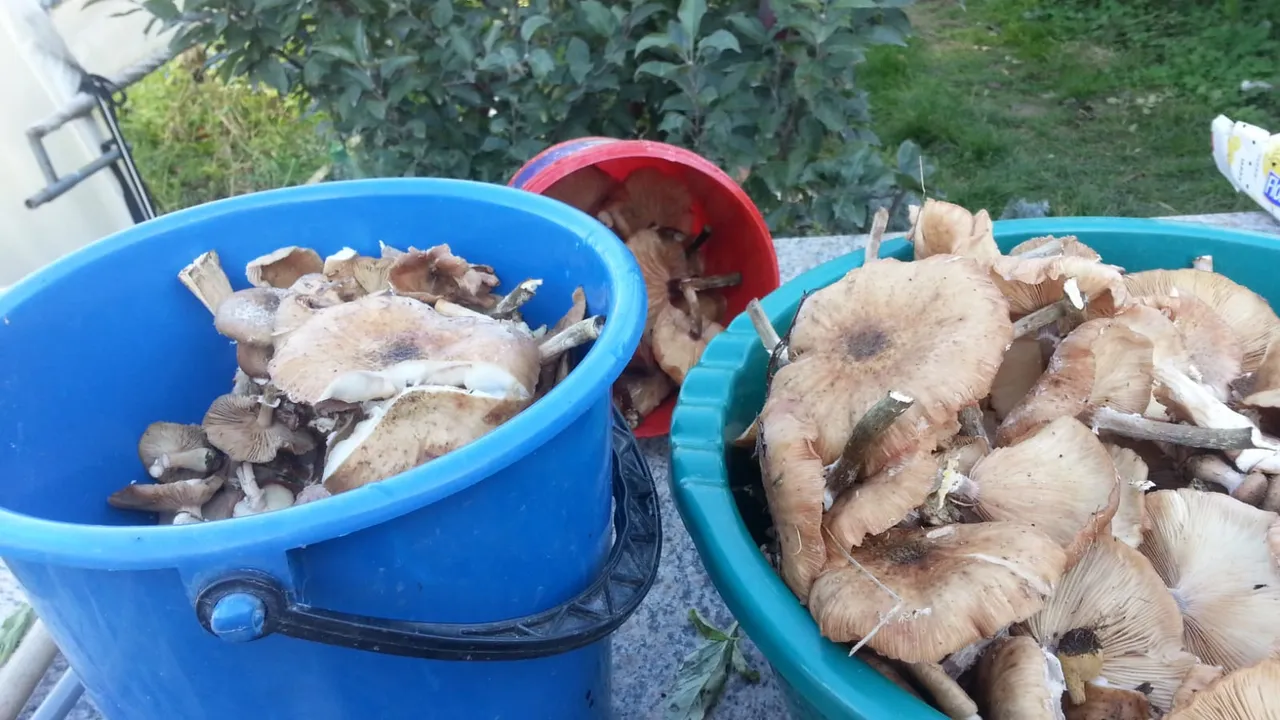Hi!
I've just discovered the HiveGarden, @bluefinstudios and his challenge , the #GroVid23 garden! So I thought about sharing a few things that we grow for ourselves, me, my gf, my mother and my younger two sisters in our common yard.
This is the first time I am posting about the things we like to grow and eat around here and I'm glad I have the chance to do it in Hive.
It might look a bit messy, but we're doing a lot of work with it and we have 1 more - a picture from last October:

We use them mostly for juice and nectar.

and the result in a fresh juice, almost looking as a smoothie:

We had plenty of those and mother likes to treat us all with them from time to time :)) So I'll tell you a few things of what I know about them:

Physalis fruits, also known as cape gooseberries or goldenberries, offer several intriguing health benefits:
Rich in Antioxidants: Physalis fruits are packed with antioxidants, such as polyphenols and carotenoids, which help combat oxidative stress in the body. These compounds may contribute to reducing the risk of chronic diseases.
High in Vitamin C: These fruits are an excellent source of vitamin C, a vital nutrient known for its immune-boosting properties. Vitamin C also plays a role in collagen formation, promoting healthy skin and supporting wound healing.
Good for Eye Health: Physalis fruits contain significant amounts of beta-carotene, a precursor to vitamin A. Vitamin A is essential for maintaining healthy vision and supporting overall eye health.
Anti-Inflammatory Properties: Some studies suggest that physalis fruits may possess anti-inflammatory properties, potentially helping to reduce inflammation in the body. Chronic inflammation is associated with various health issues, and consuming anti-inflammatory foods can be beneficial.
Low in Calories, High in Fiber: Physalis fruits are a low-calorie snack option that is also rich in dietary fiber. This combination can contribute to a feeling of fullness, making them a healthy choice for those looking to manage their weight.
Source of B Vitamins: Physalis fruits contain B vitamins, including B1 (thiamine), B2 (riboflavin), and B3 (niacin). These vitamins play essential roles in energy metabolism, nerve function, and overall cellular health.
Versatile Culinary Uses: Physalis fruits can be enjoyed in various ways, such as fresh, dried, or as part of salads, desserts, and jams. Their unique sweet and tangy flavor adds a delightful twist to different dishes.
Aid in Digestion: The dietary fiber content in physalis fruits supports digestive health by promoting regular bowel movements and preventing constipation. Adequate fiber intake is crucial for maintaining a healthy digestive system.
Buuuutttt - they didn't fixed my irritated gut yet.
Now let's see more of what we have around here:
Our "ladies in red"

Some yummy mushrooms that we save for the winter, usually:

And I promise to show you more next time. Even share with you our methods for preserving fruits and vegetables treated with no chemical.
My commitment to maintaining a chemical-free approach in the cultivation of fruits and vegetables has always been deeply rooted in a personal philosophy centered around environmental consciousness and a dedication to sustainable gardening practices. Tendentious words, but, truly, my mother and my father managed to pass along these healthy values to me and to my sisters and now I am teaching my gf the same stuff. Teaching....ummm...more like suggesting her these good practices. In making the conscious decision to abstain from chemical treatments, I prioritize the consumption of food in its most natural state, because I do care about the pesticide residues and the synthetic chemicals commonly present in conventionally grown produce. This choice is a legacy my parents managed to pass along to me and my commitment to fostering a toxin-free environment is for my personal health but also for the greater ecosystem.
In contrast to chemical interventions, I have chosen to utilize boiled and cooled mugwort as a natural alternative for the care of certain plants and trees. This decision has really been made based upon my belief in harnessing the power of traditional and organic remedies, recognizing mugwort's natural pesticidal properties. By opting for this natural deterrent against pests, I align my gardening practices with a commitment to minimizing harm to the environment compared to using synthetic alternatives.
Beyond the practical considerations of plant health, my decisions are supporting more....(I dare to think so) .... a broader commitment to biodiversity and the resilience of the ecosystem. I understand and appreciate the interconnectedness of all living organisms within my/our garden, and I actively strive to create an environment where beneficial insects, microbes, and other natural elements can thrive.
This hands-on approach to gardening reveals my personal connection to the cultivation process. Through active engagement in the well-being of my plants, I think that I maybe manage to foster a sense of stewardship and responsibility towards creating a harmonious and thriving green space. I care with my whole heart and I believe that my personalized approach nurtures the soil and plants and also deepens my appreciation for the intricate web of life within my garden.
Soooo.... my decision not to treat fruits and vegetables with chemicals while utilizing boiled and cooled mugwort for plant care is a manifestation of a holistic and environmentally conscious gardening philosophy that came from my parents and their parents and so on. It shows my commitment to natural, sustainable practices, prioritizing health, biodiversity, and the overall well-being of the ecosystem as I actively contribute to a greener, more sustainable future.
Thanks for reading! And if this article is OK and if people will enjoy reading it, I will come with more pictures and insights about our gardening days.
With respect,
Zpek
